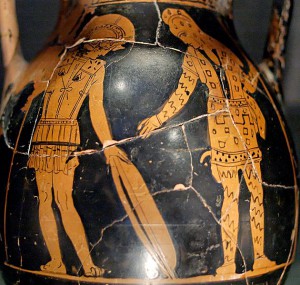~A guest post by Janet M Ozsolak~
One of the Core Vocabulary terms of Hour 24 of Gregory Nagy’s The Ancient Greek Hero in 24 Hours[1] is xenos which means,
xenos [ξένος], plural xenoi [ξένοι] ‘stranger who should be treated like a guest by a host, or like a host by a guest; xeniā [ξενία] ‘reciprocal relationship between xenoi’; when the rules of xeniā do not work, a xenos risks defaulting to the status of simply stranger.
We have seen many times in Iliad and Odyssey that a stranger comes, he is accepted by the house. The host and the guest establish a reciprocal relationship through rituals. They make libations, honor gods and share a meal. After sufficient eating and drinking, the host asks the lineage of the stranger. Once the host/guest relationship has been established, this special relationship carries on in both families. The guest and the host are strangers no more.
The exchange of gifts, especially the ones given by the host signify the importance of the newly established relationship. An interesting reference to xeniā happens right in the middle of a battlefield, in Iliad 6.119-236. Diomedes and Glaukos are the ones who will engage in a single combat for Achaeans and Trojans respectively. Diomedes questions if Glaukos is a god. Glaukos tells him his lineage, a possible battle scene takes an interesting turn.
Here is the end of the conversation between lines 215–231 of Iliad Scroll 6:
[215] “Then,” he (Diomedes) said, “you are an old friend of my father’s house. Great Oineus once entertained Bellerophon the blameless for twenty days, and the two exchanged presents. Oineus gave a belt rich with purple, [220] and Bellerophon a double cup, which I left at home when I set out for Troy. I do not remember Tydeus, for he was taken from us while I was yet a child, when the army of the Achaeans was cut to pieces before Thebes. Henceforth, however, I must be your host in middle Argos, [225] and you mine in Lycia, if I should ever go to that locale [dēmos]; let us avoid one another’s spears even during a general engagement; there are many noble Trojans and allies whom I can kill, if I overtake them and the gods deliver them into my hand; so again with yourself, there are many Achaeans whose lives you may take if you can; [230] we two, then, will exchange armor, that all present may know of the old ties that subsist between us.” With these words they sprang from their chariots, grasped one another’s hands, and plighted friendship.
Sourcebook[2]
A distant xeniā was remembered and re-established with new exchanges of gifts. There is an art of giving and receiving gifts and sharing a meal while honoring gods. The ritual creates such a bond that stops fighting, at least for the moment.
Beautiful! Do you have a favorite xeniā scene, maybe one that did not end in such harmony?
If you are a member, please post your comments in the forum.
Notes
[1] H24H: Nagy, Gregory. 2013. The Ancient Greek Hero in 24 Hours. Harvard University Press, Cambridge, MA: 2013. Available online at the Center for Hellenic Studies.
https://nrs.harvard.edu/urn-3:hul.ebook:CHS_NagyG.The_Ancient_Greek_Hero_in_24_Hours.2013
[2] Sourcebook: The Ancient Greek Hero in 24 Hours Sourcebook of Original Greek Texts Translated into English, Gregory Nagy, General Editor.
Image credit
Hasselmann Painter: Diomedes exchanging weapons with Glaucus, c420 BCE. Photo: Jastrow, public domain, via Wikimedia Commons
___
Janet M Ozsolak is a member of the Community Development Team.
